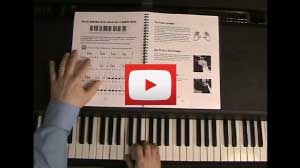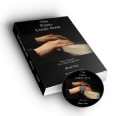Rock Piano
When did rock piano begin? Some people say the first rock and roll record was Jackie Brenson's "Rocket 88," recorded in 1951, and based on boogie woogie piano great Pete Johnson's "Rocket 88 Boogie," from 1946. Others place the birth of rock and roll with either the rise of Elvis Presley, or Bill Haley and the Comets.
The elements of rock piano were evident in the late 40's with Fats Domino's first big hit, "The Fat Man," in 1949. Those same elements were borrowed from Amos Milburn and other jump blues pianists (see Blues Piano), who borrowed from the boogie-woogie pianists before them. By the time "The Killer," Jerry Lee Lewis came along, we were calling it rock and roll piano.
Early Rock Piano
Early rock and roll piano was based on boogie woogie and blues, but played faster and harder. All of the early major rock pianists were influenced by the boogie-woogie craze that swept America in the late 1930's, and continued into the 1950's.
In New Orleans, Fats Domino was playing a boogie style, but with a happy rhumba feel. The piano played a major role in the New Orleans music of the 1950's. Other early rock pianists recorded there, including Huey Piano Smith, Little Richard and Ray Charles.
Jerry Lee Lewis, also from Louisiana, shook the world with his powerful rock piano. He changed the game, making attitude an important element in the rock and roller's image. He would kick the piano bench away, and play the piano with his foot banging on the keys. Jerry Lee recorded in Memphis at Sun Records, also home to the biggest rising star in rock and roll, Elvis.
Macon, Georgia's Little Richard was not to be outdone, always over the top with his high energy performance. He was one of the first to bring a theatrical style to rock and roll showmanship. Like Jerry Lee, he also based his style on a hyped-up boogie woogie sound.
Johnnie Johnson helped guitarist and singer-songwriter Chuck Berry craft a unique straight-eighths rock sound for Chicago's Chess Records, with the piano playing a supporting role to the guitar. This would become the default design for many rock bands that followed.
60's Rock Piano
In the 1960's, rock pianists were finding inspiration from other sources besides boogie and blues. Gospel, country and standards were influencing pianists. The world of rock piano/keyboard included the pop music of the day.
The piano played a huge role in the songwriting at the Brill Building in New York. In Detroit, Motown Records songs were constructed with a defined piano part. In New Orleans, Allen Toussaint's piano shaped the sound of the hits emminating from the Minit Records label. Booker T. Jones is best known for his Hammond organ work, but he also played some very memorable piano on most of the soul hits from Stax Records in Memphis.
Aretha Franklin, the "Queen of Soul," put her unique gospel/blues piano sound on many of her records. Another singer-pianist, Laura Nyro, is not as well known, but her rock and gospel hybrid has been a huge influence on many others including Elton John.
The Beatles changed music forever, and Paul McCartney's ballad piano style has been emulated on pop hits for decades since. Another Englishman, Steve Winwood brought a lyricism to rock piano, and was one of the first to be considered a rock "keyboardist." Nicky Hopkins, who recorded with the Rolling Stones and others defined what rock piano sounded like.
70's Rock Piano
In the 1970's, rock pianists diversified further. Many of the pianists' styles of the '60's were still evolving, and new artists were changing the music.
Carole King, who wrote many of the Brill Building hits of the early '60's exploded upon the scene with her singer/songwriter piano sound. Christine McVie, pianist in the band Fleetwood Mac, created many of the songs that many people think of as "70's rock."
Leon Russell played piano on some of the biggest hits in the '60's, as a session player, then made his own southern blues and gospel influenced piano rock. Another southerner, Chuck Leavell joined the Allman Brothers Band, taking the piano to new heights. Bill Payne not only co-founded the swamp-boogie band Little Feat, but played on hundreds of records as a sideman.
Billy Preston, who was best known as the "fifth Beatle," also had smash hits in the '70's playing funky piano and other keyboards. Stevie Wonder, who also had hits in the '60's, came into his own as a major artist in the '70's, not only playing piano, but many other instruments including any kind of keyboard possible. Donald Fagen, of Steely Dan, is considered to have invented what is known as "jazz-rock."
Read about Fleetwood Mac's Christine McVie....
Read about Steely Dan's Donald Fagen....
Read about Little Feat's Bill Payne....
Read about The Allman Brother's and The Rolling Stone's Chuck Leavell....
What two people come to mind as "rock pianists" more often than anyone else? Elton John and Billy Joel are what people think of when they think "rock piano."
Start Playing Piano Today with the Piano Guide Quick Start Course!
Easy to follow step-by-step lessons designed for adult beginners. The next best thing to private lessons!
What You'll Learn:
- Notes on the piano/keyboard
- Proper fingering
- C major scale
- Chords
- How to read music
- And much more!

Video lessons - watch as I play everything for you.

